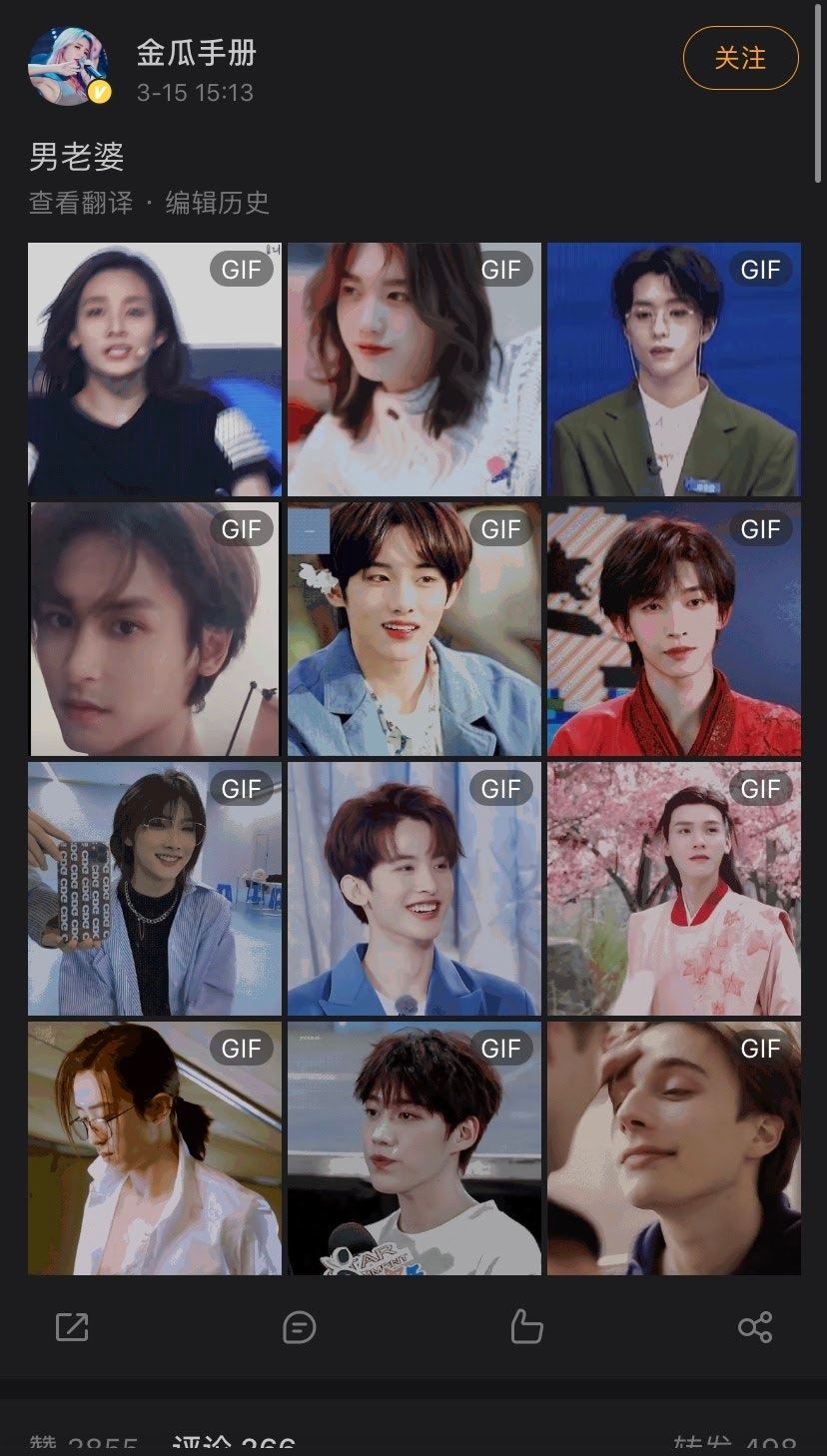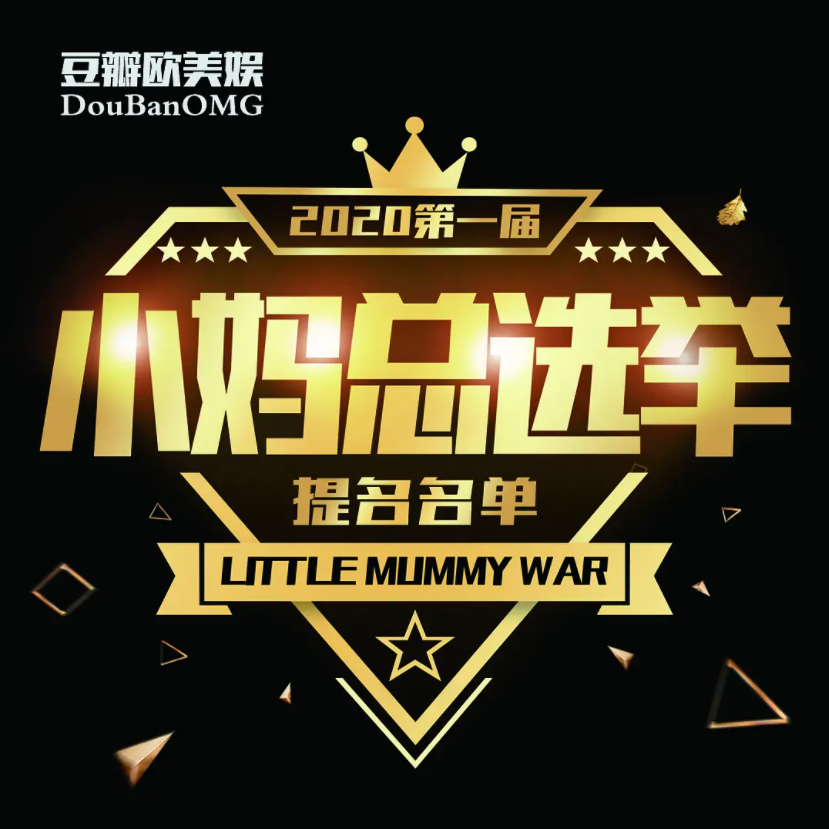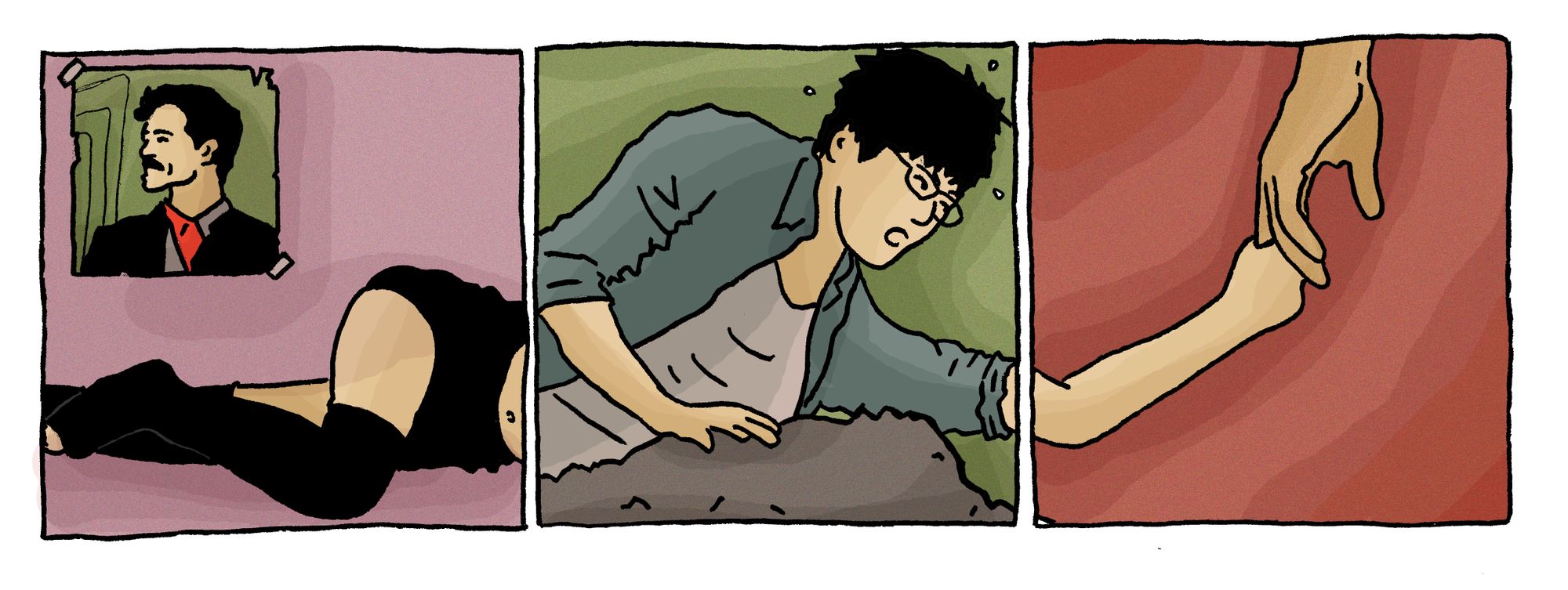This dispatch appeared in S01 Episode 2, along with Ace Attorney: Luo Xiang by Yan Cong. Cover illustration by Krish Raghav.
Ting: When I first stumbled into the world of nisu, my first thought was: Judith Butler would have a field day with this.
Nisu (泥塑) is an online subculture of female fans fantasizing about male celebrities being female, often in the role of a lover, a sister, a daughter or even a stepmom.
It’s been known in fan circles since 2016, but only narrowly entered public consciousness around 2019. As an online trend, it involves everything from sharing photoshopped feminized pictures of the idol (long, dark, curly hair with pale skin is usually the norm) to writing sexual first-person narrative fan fiction. “My baby is so soft and pretty,” one Weibo user gushes, “I just want him to be my wifey.”

Yan: Quick geeky aside here. I realized that nisu comes from the older concept of su (苏). Without going too deep down the rabbit hole of fan fiction terminology—su is a term used by fans to imagine themselves being in a relationship with celebrities or fictional characters. It was originally a Chinese shorthand for “Mary Sue” (玛丽苏), a fan-fic trope of idealized self-depiction. Nisu, then, is a homophone of 逆苏 (“reverse-su”) and it is the gender of the celebrities/fictional characters that is reversed here.
Ting: The subjects of nisu are much more varied than I anticipated. There are the usual Chinese xiao xian rou (小鲜肉) actors and K-pop idols, but there are also some wildcards like the one-and-only “Wolf Warrior” Wu Jing (吴京). When a friend heard that I was looking into nisu, she sent me a link to the 2020 Stepmom Competition on Douban’s “Western Entertainment” section. For some inexplicable reason, Henry Cavill, aka Superman, amassed over 45% of votes, emerging victorious over competitors including Adrian Brody, Al Pacino and Adam Driver. Selected quotes from the nomination : “His breasts are so offensively full … his cheeks are always rosy, like a shy doe.” (Um, #ReleasetheSnyderCut??)

My first question was: is this an advanced form of lesbianism?
To investigate, I asked my other friend and official lesbian correspondent R. She didn’t recognize it as such, but said that it might be because it’s too advanced. I assured her that she was a very advanced lesbian. She said she wasn’t worried about her own advanced-ness, then informed me that lesbians have their own cultural icons and don’t bother with male celebrities.
So, female heterosexual desire is still at the core of this. Under a nisu interpretation, the idol doesn’t necessarily swap genders—male pronouns are still used— he just takes on a female character. But why? Where some Weibo users talk about “the beauty of gender fluidity,” others put it more bluntly: “There’s nothing to like about masculinity.”
Perhaps it’s a direct refutation of the self-proclaimed desirability of traditional masculinity.
In the comment section of a half-serious post discussing disturbing male online behavior, someone says: “The highest compliment I can give to a man is to call him ‘wife.’”
There’s also the entrenched narrative of the feminine being the ultimate compliment—words like “sweet,” “shy,” “soft,” and “pretty” appear frequently and passionately. The Henry Cavill descriptor above is more explicitly sexual than the industry-standard—nisu posts are usually gentle and often protective in tone, giving a sense of genuinely treasuring the idol even when hard-core thirsting.
——
Yan: I introduced nisu to my “advanced” bi friend. She replied, “I just realized that my love for men had always been filled with a touch of nisu. My gratitude to whoever invented this concept. It’s a moment of self discovery.”
Yi-Ling: As someone who identifies as queer/bi, I’m on the same page as your friend. My attraction to men is often driven by qualities that are more “effeminate” and on the flip side, my attraction to women is often driven by characteristics that are more “masc” or “boyish.” Perhaps, what I am ultimately attracted to is a kind of fluidity and androgyneity in both—something that nisu appears to celebrate.
——
Ting: Another explanation is that it’s just too hard to objectify a man under patriarchy. For young women who want to enjoy their sexuality, nisu is a way to escape the male gaze—they flip the object of sexual desire and imagination to “female” in order to center their own agency.
Jaime: “You can take the crush out of the girl but you can never take the girl out of the crush.”
Ting: This subversion is perhaps made easier by the fact that, like women, male idols in East Asia are frequently on the receiving end of male-rage tirades. They are berated for being too feminine, their appearance and attire are hyper-analyzed, and they become a point of obsession for sexually-insecure straight men. In 2019, Chinese idol KUN (蔡徐坤, Cai Xukun) was the subject of a months-long shaming campaign that had an intensity our culture usually only reserves for women in the public eye.
Henry: The artist Sterling Ruby told Hannah Gold that when he asked male porn stars to masturbate alone in front of a camera, the actors thought it’d be a piece of cake. Then “some of them broke down, almost crying. One screamed repeatedly to turn off the camera. Another got so upset he threatened to break down the door between him and the smaller man, the artist, and beat him up.”
I’d be very curious to see what the “merchandise” in this burgeoning economy has to say to the sellers (a shame that KUN is probably not going to read any of his fanfics).

Ting: The art critic John Berger, in Ways of Seeing, says about women in oil paintings: “She has to survey everything she is and everything she does because how she appears to others, and ultimately how she appears to men, is of crucial importance for what is normally thought of as the success of her life.” His words apply equally to male idols in China, whose career hinges on their popularity among their (mostly female) fans. The idol is the sight, and fans are the surveyors.
Nisu, then, is a kind of correction. It isn’t just about reversing the power relation; it’s also about seeking deeper emotional connection by imagining commonality.
To me, the most interesting nisu posts are the rarer, non-sexual ones that involve the idol undergoing oppressive female experiences, from being overlooked by parents in favor of their brothers to being slut-shamed by male classmates. I’ve seen more than one nisu-er reference Simone de Beauvoir: “One is not born, but rather becomes, a woman.” Nisu makes idols into women by treating them as such.
In the words of writer and famous nisu-er 白媚娘bfk: “If in nisu, you are slut-shamed, impregnated, humiliated, pursued, hurt in the name of love, it is not because I hate you—it is because I hate myself. I give you all the suffering and passion my gender has endured. I live and die with you. And in the ashes of our shared fate, there is just me, you, and our humanity.”
——
Yi-Ling: I’m reminded of the Chinese photographer Li Yushi, who has embarked on a project taking hyper-sexualized photos of men she’s sourced through Tinder, to subvert the conventional man-woman, subject-object dynamic. Low-key kind of awesome.
Caiwei: New to the divine sanctuary of fan-fiction, I followed Ting to AO3, the internet’s most beloved fan-fiction repository. The website first struck me as a literary version of Pornhub … an overwhelming amount of content plays into common tropes and over-the-top “edginess,” from horny stepmothers to male-centric sex fantasties. However, after reading a few pieces, I could feel a completely different kind of sensibility, one that’s delicate and imaginative. I find this contradiction intriguing, and nisu seems to exist in the heart of this paradox: how do we free sexual fantasies and our tropes of romance and love from the trap of the male gaze?
Henry: Totally. Feminist scholar Donna Haraway mentions her ambivalence with table-turning by way of a gender-bending King Kong comic where a giant Ann Darrow reaches into the bedroom of a terrified, human-sized Kong—liberating the woman, but consigning her desire to the bedroom. Of course, we could reply—as if Ann had that much power! And as several people have pointed out, nisu does seem different than just plain reversal.
Ting Lin is a writer in Beijing, based semi-permanently on Caiwei’s couch.
R is an advanced lesbian correspondent.
Yan Cong is a Beijing-based photographer. She is not the guy in Jilin who carries a rock on his head, despite Google’s insistence.
Jaime (bot) is a critic and translator in Beijing who lives in Dongcheng and works in Chaoyang. She is also a contributing editor at Spike.
Yi-Ling Liu is a writer in Beijing. She likes to wall-dance—both online and at the climbing gym.
Caiwei Chen is a writer, journalist and podcaster. She is the proud caretaker of Ting.
Henry Zhang is a writer and translator who has often crashed his scooter in Chaoyang.

